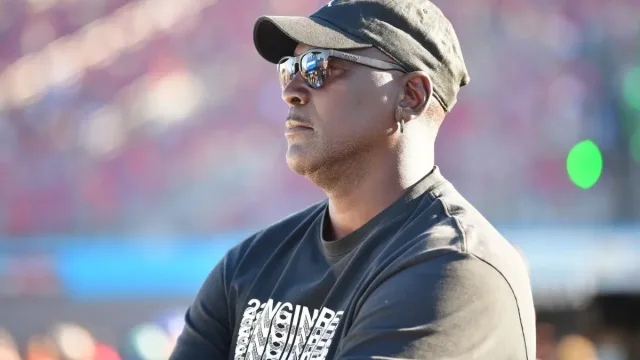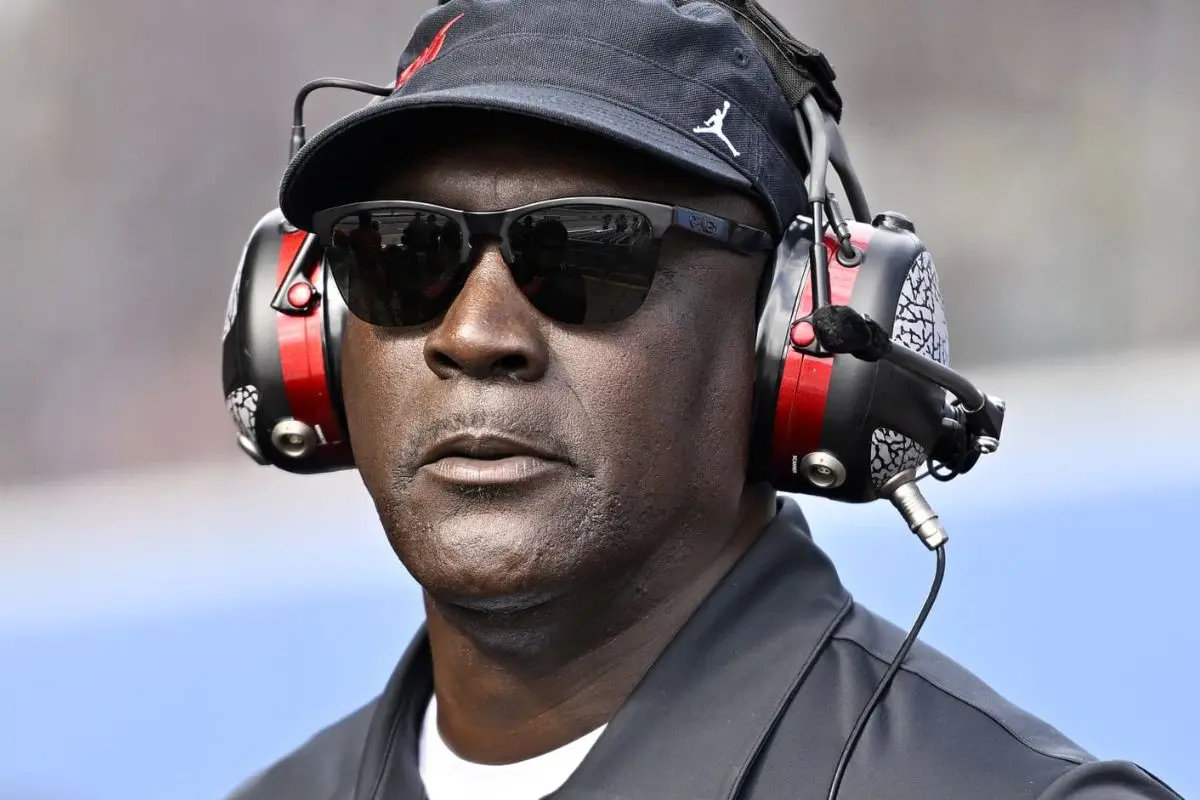Michael Jordan and 23XI Racing Defeat NASCAR in Legal Battle: Michael Jordan’s 23XI Racing and Front Row Motorsports emerged victorious in a crucial legal battle against NASCAR, securing a coveted 2025 charter. This success highlights a changing tide in NASCAR’s governance, driven by accusations of monopolistic practices and favoritism in charter transfers. The charters, each valued at $25 million, represent a tactical win, showcasing the skill and resilience of these teams. Michael Jordan’s symbolic gestures of independence hint at a larger narrative challenging NASCAR’s control, echoing calls for reform and transparency. This case could redefine future negotiations, inviting curiosity about the evolving dynamics and power shifts within NASCAR.
Key Highlights
- Michael Jordan’s team, 23XI Racing, won a legal battle securing a charter for 2025, boosting their competitive edge in NASCAR.
- The charter, valued at $25 million, strengthens 23XI Racing’s strategic planning and future race participation.
- The legal victory challenges NASCAR’s governance and highlights the need for transparency in charter negotiations.
- The court’s decision may influence future charter dealings and encourage fairness in NASCAR’s governance practices.
- Michael Jordan’s involvement underscores 23XI Racing’s resilience, signaling a shift in power dynamics within the sport.
NASCAR and Rebel Teams Reach Agreement
Reaching a significant moment in the history of NASCAR, the recent agreement between the organization and the so-called rebellious teams marks a substantial turning point in the sport’s governance dynamics. The long-standing discord, primarily fueled by the teams’ dissatisfaction with NASCAR’s charter system and revenue distribution, had threatened to split the sport at its seams. This agreement signals a hard-won compromise, illustrating the complexities inherent in balancing tradition with progressive reform.
In this conflict there were teams like 23XI Racing and Front Row Motorsports, who, under the influential stewardship of figures such as Michael Jordan, sought a reformation of NASCAR’s operating model. This was not merely a battle over financial stakes; it was a philosophical confrontation about the future path of stock car racing.
The agreement, while not fully disclosed, reportedly includes adjustments in revenue sharing and governance structures, reflecting the demands for more equitable conditions for teams.
The implications of this settlement are profound. By acceding to some of the teams’ demands, NASCAR has set a precedent for more collaborative interactions with its participants. This move may catalyze further changes within other sports organizations facing similar internal frictions.
23XI and FRM Celebrate a Legal Victory
In an unexpected yet monumental development, 23XI Racing and Front Row Motorsports have secured a preliminary injunction that allows them to race as chartered teams in 2025, while also facilitating the fundamental Stewart-Haas Racing (SHR) charter transfers.
“BREAKING: 23XI and Front Row Motorsports have obtained the preliminary injunction to race as chartered teams in 2025 as well as for approval of the SHR transfers.” – (Bob Pockrass)
This legal victory represents a significant shift in NASCAR, highlighting the dynamic interplay between established racing entities and the governing body. The injunction, which acts as a judicial green light, positions these teams advantageously, ensuring their competitive presence in the upcoming season and fortifying their tactical planning for future races.
The success stems from a broader legal battle involving high-profile stakeholders, such as Tony Stewart and Gene Haas, whose charters have been the subject of contentious negotiations. Each charter, reportedly valued at $25 million, represents more than just a ticket to race—it embodies the tactical assets vital for any team aiming to solidify its legacy within NASCAR.
The acquisition and retention of these charters by 23XI Racing and Front Row Motorsports signal not only a financial coup but a demonstration of their legal expertise and resolve.
Denny Hamlin, co-owner of 23XI Racing, encapsulated the prevailing sentiment with his exuberant post on X, simply stating, “YESSSSSSS!!!!!!!” This exuberance reflects the broader relief and optimism within the teams, as they navigate these turbulent waters.
YESSSSSSS!!!!!!!
— Denny Hamlin (@dennyhamlin) December 18, 2024
For Michael Jordan, the figurehead behind 23XI, this victory solidifies his foothold within the sport, offering a compelling narrative of resilience and tactical foresight in the face of adversity.
NASCAR’s Alleged Betrayal of Charter Transfers
Tensions rose as allegations of betrayal surfaced regarding NASCAR’s handling of charter transfers, revealing promises and expectations. At the core of the dispute lies the claim by Joe Custer, who asserts that NASCAR officials guaranteed him the transfer approvals would swiftly follow once the necessary documents were submitted. This expectation set the stage for what many in the industry view as a breach of trust, shaking the foundational relationships between teams and the governing body.
“NASCAR officials conveyed to me on more than one occasion that once the Buyers submitted their Transfer Approval Forms and signed their respective Joinder Agreements, NASCAR would promptly provide the necessary approvals to transfer the Charter Agreements to the Buyers.” – (Joe Custer)
NASCAR’s charter system, designed to provide stability and guarantee long-term investment for racing teams, has become a battleground of intrigue. The allegations suggest a disconnect between NASCAR’s public declarations and private reassurances, leaving stakeholders questioning the integrity of the process.
For 23XI Racing and Front Row Motorsports (FRM), this perceived betrayal was not merely a procedural hiccup but a potential threat to their tactical aspirations. In the eyes of 23XI and FRM, securing the charter was not just a business transaction but a crucial move vital for their competitive future. The alleged delay in approvals, consequently, was not only a contractual breach but an impediment to their growth path.
Subtle Dig by Michael Jordan at NASCAR in Charlotte
Amidst the bustling atmosphere of the Jumpman Invitational in Charlotte, Michael Jordan’s subtle tactic sent waves through the NASCAR community—a calculated display that spoke volumes without uttering a word. While college basketball matches captured the spotlight, a less conspicuous yet telling exhibition took place: the showcasing of a 23XI car devoid of the NASCAR trademark, a shift that resonated deeply amidst ongoing legal tensions.
This exhibition, seemingly innocuous, was a shrewd maneuver by Jordan and his team, 23XI Racing, as they find themselves embroiled in a legal battle with NASCAR. By presenting a car without the signature NASCAR branding, Jordan delivered a message of independence and defiance, highlighting 23XI’s presence in the sport.
Jordan, known for his competitive spirit and tactical insight, utilized this opportunity to emphasize 23XI’s capability to stand on its own merits, independent of traditional NASCAR associations. This act not only accentuates their resilience amid legal disputes but also serves as a reminder of Jordan’s influential presence in racing.
One of the 23XI cars at the Jumpman Invitational in Charlotte (via u/Au1ket) https://t.co/ui3Bz3uAKt #NASCAR pic.twitter.com/h8KRGNDzdW
— r/NASCAR on Reddit (@NASCARonReddit) December 18, 2024
Monopoly Symbolism and Reactions from NASCAR Critics
Eliciting strong reactions from critics and fans, the symbolism of monopoly within NASCAR speaks volumes about the current state of affairs in the motorsport. This contentious imagery was thrust into the spotlight when NASCAR proudly displayed Joey Logano’s championship victory with monopoly cards—an iconic representation that struck a chord with many stakeholders, particularly Denny Hamlin’s team.
Hamlin’s sardonic response, “Monopoly cards. Perfect,” encapsulates the simmering discontent felt by some within the racing community who perceive NASCAR as wielding its influence with monopolistic tendencies.
The use of monopoly symbolism is not merely a marketing gimmick but a reflection of the underlying power dynamics within NASCAR. It highlights the perception among certain teams that the sport’s governance structures cater to an elite few, stifling competition and innovation. This imagery, consequently, transcends its playful exterior, becoming a provocative symbol of the ongoing struggle for equity and fair play within the sport.
Critics argue that NASCAR’s actions, including its handling of team charters and distribution of resources, further entrench this monopoly narrative. The recent legal victory by Michael Jordan’s 23XI Racing, securing a 2025 charter, is seen by many as a step toward challenging this status quo. It signals a shift where influential figures are no longer content to acquiesce to NASCAR’s overarching control.
News in Brief: Michael Jordan and 23XI Racing Defeat NASCAR in Legal Battle
The resolution of the legal dispute between NASCAR and its teams, including 23XI and FRM, emphasizes the complexities of charter agreements within motorsports. The alleged betrayal by NASCAR on charter transfers raised critical questions about governance and contract fidelity.
Michael Jordan’s subtle commentary in Charlotte reflects broader tensions, symbolized by monopoly motifs, resonating with critics of NASCAR’s administrative decisions. This victory not only secures future operations for the teams involved but also highlights ongoing challenges in sports management.
ALSO READ: NASCAR Lawsuit Reassigned to New Judge as Michael Jordan Faces Legal Setback



